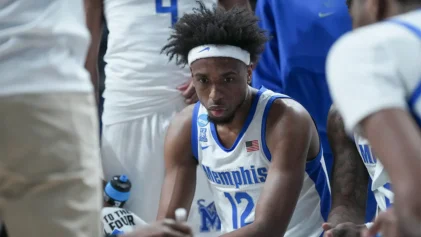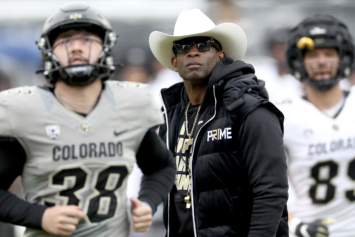The worst part of white privilege is its audacity.
It’s a learned belief system that is rooted in superiority and inequality.
“I’m better than you because of the color of my skin, and my experiences are the only ones that deserve merit.”
That mentality is what led Felicity Huffman to pay $15,000 to fix her privileged daughter’s SAT scores, and why Tim Tebow believes that compensating student-athletes would diminish college athletics.
“In my desperation to be a good mother I talked myself into believing that all I was doing was giving my daughter a fair shot,” Huffman recently wrote to a judge. “I see the irony in that statement now, because what I have done is the opposite of fair.”
Pay attention to the language Huffman used.
She didn’t see herself as a good mother, as desperation was the reason why she broke the law. She believed her daughter wasn’t going to be given a fair shot, despite the wealth and privilege she’d always known.
Last Friday, Huffman became the first parent to receive a judgment in the college admissions scandal, as she was sentenced to 14 days in a federal prison for her role in the conspiracy that included 34 rich, and mostly white, parents that are believed to have paid thousands to better their children’s chances of admittance to elite colleges and universities.
Huffman will also serve 250 hours of community service and pay a $30,000 fine. She was arrested back in March with conspiracy to commit mail fraud and honest services fraud and pleaded guilty to paying $15,000 to get her daughter’s incorrect SAT answers changed.
Like Huffman, Tebow’s mentality also focuses on wealth, and who should be allowed to take advantage of its benefits.
“I knew going to Florida, my dream school, where I wanted to go, the passion for it, and if I could support my team, support my college, support my university, that’s what it’s all about,” said Tebow on Friday’s episode of ESPN’s “First Take.”
“But now we’re changing it from us, from we, from my university, from being an alumni where I care, which makes college football and college sports special, to then, okay, it’s not about us, it’s not about we, it’s just about me. And yes, I know we live in a selfish culture where it’s all about us, but we’re just adding and piling on to that where it changes what’s special about college football.”
“That’s why people are more passionate about college sports than they are the NFL. That’s why the stadiums are bigger in college than they are in the NFL, because it’s about your team. It’s about your university. It’s about where my family wanted to go. It’s about where my grandfather had a dream of seeing Florida win an SEC championship, and you’re taking that away so that young kids can earn a dollar, and that’s just not where I feel like college football needs to go.”
His rant was about the Fair Pay to Play Act, a bill that was recently passed in the California state legislature that would allow student-athletes to make money off their names and likenesses. The NCAA has already threatened to ban schools in California from playing in NCAA Championship if the bill becomes law.
Like Huffman and Tebow, the people that run the NCAA aren’t hurting for money, and are white. In 2017, the NCAA, a non-profit organization, reported more than a billion dollars in revenue.
Tebow believes that student-athletes don’t deserve compensation because he didn’t want, or need, it when he was winning Heisman trophies and national championships at the University of Florida, due to his affluent upbringing.
Tebow is not the humble Bible-toting Jesus freak he claims to be. He understands that football is a team sport, and the success he achieved on the field had a lot to do with the talented men of color he played with that elevated his game. Many of those men came from humble beginnings, and would have benefitted from making money off their likeness. That not only makes Tebow fake, but also a hypocrite.
Huffman thought that her daughter was somehow disadvantaged despite all the perks that come along with being the child of two famous actors. That’s the thinking of a narcissist whose actions oppressed and affected people of color.
That mindset is what makes white privilege so dangerous. It’s an entitlement that tries to erase the concepts of race and socioeconomics, and the obstacles that people of color have historically been forced to hurdle.
In 2011, a black woman in Ohio named Kelley Williams-Bolar was found guilty of grand theft and tampering with evidence and sentenced to 10 days in jail, three years of probation, and given a $70,000 fine for falsifying her daughters’ home address. Unlike Huffman, Williams-Bolar did not have $15,000 to spare and used her father’s home address so that her daughters could go to a better school.
In 2014, days before former UConn guard Shabazz Napier, a black man, played in the National Championship Game, he told reporters about the trials and tribulations of being a student-athlete.
“We do have hungry nights that we don’t have enough money to get food. Sometimes money is needed. I don’t think you should stretch it out to hundreds of thousands of dollars for playing, because a lot of times guys don’t know how to handle themselves with money, he said.
“Sometimes, there’s hungry nights where I’m not able to eat, but I still gotta play up to my capabilities.”
Days later the NCAA’s Legislative Council ruled that Division I student-athletes could now receive unlimited meals and snacks in conjunction with their school’s participation.
Huffman and Tebow made willful decisions, while Williams-Bolar and Napier were forced to deal with a system that wasn’t designed in their favor. It’s how things work in this country.
Because while America may be labeled as the land of the free, as we can see, that idea often comes with stipulations.



